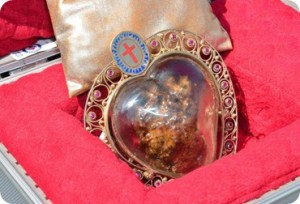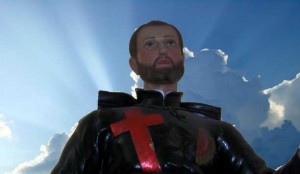In recent days the relic of the heart of St. Camillus has been on a pilgrimage to the archdiocese of Cosenza-Bisignano. For the occasion, Archbishop Salvatore Nunnari sent the message which we reproduce below:
Message of the Archbishop
For the arrival of the relic of the heart of St. Camillus de Lellis in our archdiocese of Cosenza-Bisignano
Dearest brothers and sisters, on 26 February next we will welcome the relic of St. Camillus de Lellis which for a few days will stay amongst us for the veneration of the faithful and a visit to places of suffering, according to the programme which has already bee distributed. On Thursday 6 March we will receive the relic in the cathedral where I will celebrate the Holy Mass.
 St. Camillus de Lellis, who was born in Bucchianico in 1550, was a priest and the founder of the Order of the Clerics Ministers of the Sick (known as the Camillians).
St. Camillus de Lellis, who was born in Bucchianico in 1550, was a priest and the founder of the Order of the Clerics Ministers of the Sick (known as the Camillians).
After years of military service lived amongst very many uncertainties, during which there was never any absence of that healthy disquiet that led him to search for a higher meaning to his life, disappointed and also abandoned by his friends he found himself in the condition of being a beggar who asked for alms before becoming a manual worker at the friary of the Capuchin minor friars of Manfredonia.
After a short period of time, thanks to a meeting with Fr. Angelo at the friary of the Capuchin minor friars of San Giovanni Rotondo on 2 February 1575, he fell into a deep inner crisis which led him to find in the Gospel the answer to all his questions, bringing about in him that ‘conversion’ which from that moment on changed his life.
The search of St. Camillus had only just begun when, because of an incurable wound on his foot, he was forced to go to the St. James’ Hospital of Rome. There, his illness and this wound, but above all else his direct contact with the sick and the least, led him to review the whole of his past and his future choices. He understood that Christ is not an idea but a living person who makes himself present not in the mighty of the moment but in the last and the sick. Camillus encountered the love of God specifically in the wounds of human love which, in lonely and excluded people, became an invocation and an expectation of a redemption that man on his own could not give. In this way he felt loved by God as he had never been loved and thus be began to love his brethren. Starting specifically from those who at that time were not loved by anybody, the last and those most in need, that is to say the sick.
Shortly afterwards, increasingly fascinated by Christ and supported by the Holy Spirit which in all epochs generates new energies in the Church, he founded the religious Order of the Ministers of the Sick whose charism is service to suffering man, the yardstick of those who think that they please God with their faith and who with reason alone fight for the construction of a just and supportive society. Returning to this great saint through the celebrations that will accompany us in the diocese, will be an opportunity for all of us to change our lifestyles, passing from the logic of pure exchange to the logic of giving, from a hedonistic and consumerist vision to a more giving vision, open to transcendence which transforms the lives of all men, especially the sick and the suffering, from being a pure problem to being an ineffable mystery.
St. Camillus knew how to recognise the presence of Christ in sick people whom he saw almost as another sacrament. And not only because illness and suffering do not take dignity away from man but also and above all else because they constitute the setting where God shows that He is stronger than evil and sin. The spirituality of St. Camillus is a therapy of great contemporary relevance against hopelessness and a sense of being abandoned, against that tragic and nihilistic vision of life which somewhat grips everyone. In a society such as ours, which often sees sick people as an economic cost for the whole of society at the level of health-care expenditure, and where the temptation spreads itself in many quarters to get rid of them as soon as possible. The work of St. Camillus teaches us to see life not as a burden or as a game that leads to nothing but as a gift and something therefore  that is sacred, which obliges everyone, at an individual and also a social level, to respect, protect, advance and value life at every stage and in every condition, from unborn life to its last breath.
that is sacred, which obliges everyone, at an individual and also a social level, to respect, protect, advance and value life at every stage and in every condition, from unborn life to its last breath.
The message of St. Camillus offers to our diocese and civil society as a whole a dual warning: to those who believe, it says that one should never separate charity from faith: in contrary fashion, faith is expressed in concrete deeds of charity and solidarity; to those who do not believe it says, instead, that charity is the achievement of social justice and that precisely in coming to the aid of those most in need does a caring and just society demonstrate its level of civilisation and moral progress. Let us take advantage of the meetings that will take place during these days in the name of St. Camillus to welcome this message of hope, of faith, and of charity to build up the Kingdom of God.
Cosenza, 22 February 2014
+ Salvatore NUNNARI
Metropolitan Archbishop of Cosenza-Bisignano
Look here at the press information














Camillians on Facebook
Camillians on Twitter
Camillians on Instagram